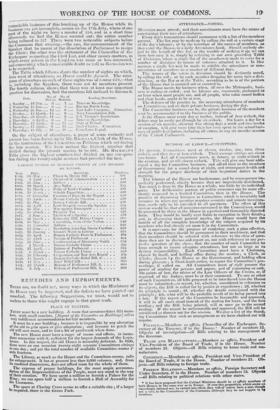ATTENDANCE-VOTING.
MEMBERS must attend; and their constituents must have the meant of ascertaining their rate of attendance.
Every day's transactions should commence with a list of the members present. The list inay be made up by culling the roll at a certain stage of the day's labours ; or by the insertion of the names of members, as they enter the House, in a daily Attendance-book. Should anybody ob- ject to the length of this list, or the trouble of making it up, we can, show how easy it is, simply by referring to our own preceding Table of Divisions, where a. single list of the members is made to serve for a number of divisions by means of columns attached to it. In like manner, a single list may be made to exhibit the attendance or non- attendance of members on a number of different (lays.
The names of the voters in divisions should be distinctly noted, by calling the roll ; or by each member dropping his name into a divi- sion-box, at the Bar or at the Table, according as he is of the portion, of the House that is counted out or counted in.
The House meets for business when, all over the Metropolis, busi.. ness is ending or ended ; and its labours are, commonly, prolonged to an hour when most people are, and all people, who value sound bodies and clear heads, ought to be at rest.
The defence of the practice is, the necessary attendance of members on Committees, and on their private business, during the day.
The Committee business can be, the private business of the members must be, accommodated to the business of the public. If the House meet every day at twelve, instead of four o'clock, the debate may be easily got through by six o'clock. Six hours a day for a session of six months, allowing five sitting days a week and two weeks of vacation, will give more time than has been spent in the actual busi- ness of public legislation, including all extras, in any six months' session of the United Parliament.


















































 Previous page
Previous page